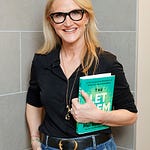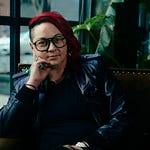I think it's important for people to recognize that no matter how fascinated you might be by a Black person’s hair, we are not an exhibit or curiosity.
You're listening to Burnt Toast. This is the podcast about diet culture, fatphobia, parenting, and health. I’m Virginia Sole-Smith, and I also write the Burnt Toast newsletter.
Today I am speaking with anti-racism activist, writer, and educator Sharon Hurley Hall. Sharon is firmly committed to doing her part to eliminate racism as the founder and curator in chief of Sharon's Anti-Racism Newsletter, one of my favorite Substacks. Sharon writes about existing while Black in majority white spaces and amplifies the voices of other anti-racism activists. Sharon is also the head of anti-racism and a special advisor for the Diverse Leaders Group.
I asked Sharon to come on the podcast to talk about a piece she wrote on the newsletter a few weeks ago about the CROWN act, Black hair, and the ways in which white people perpetrate racism against Black people for their hair. We also get into how to talk about hair and skin color differences with your kids, which I found super, super helpful and I think you will, too.
If you enjoy this episode, please subscribe, rate and review us in your podcast player! It’s free and a great way to help more folks find the show.
And! It’s time to decide what we should read for the next Burnt Toast Book Club!
I’ve culled through all of your suggestions and narrowed it down to these five (mostly because the Substack poll-maker limits me to five choices). I was going to stick with fiction because it’s summer and I’m in beach read mode, but I made an exception for Angela Garbes because, it’s Angela Garbes. (Which is to say, if we don’t pick her for August, we’ll do it for September or October!) You have until the end of this week to vote. I’ll announce the pick on Tuesday. (The discussion thread will go live Wednesday, August 31 at 12pm Eastern!)
Episode 54 Transcript
Virginia
Hi Sharon! Why don't we start by having you tell my listeners a little more about yourself and your work?
Sharon
Okay, so I am an anti-racism writer and educator, a former journalist, and I have been writing about anti-racism-related stuff for longer than it appears. I actually wrote my first article in 2016, but I wasn't doing it consistently. I launched an anti-racism newsletter in 2020. So it's just been going for just about two years now. In it, I share my perspectives as a global citizen. I was born in England, I grew up in the Caribbean, I lived in England as an adult. I visited the US. I lived in France. I've been in a lot of places, and I've experienced racism everywhere. And so I bring that lens to what I write about. You know, quite often we think what we're experiencing is the only way it's being experienced or is unique to the location that we're in. And my experience is that there's a lot of commonality in how these things operate in different places.
Virginia
Oh, that's so interesting. I have British and American citizenship, but I've lived my whole life in America. And I definitely tend to think of racism as this very American issue. But as you're saying that, I'm realizing how incredibly reductive that is. Although Americans certainly are a big part of the problem.
Sharon
Yes, but—or yes and, I suppose. Let's not forget that all of this started with the British people—well, British and Europeans—who colonized everywhere.
Virginia
Sure did. Yup. Absolutely.
Sharon
There are many places besides the USA that share this history of enslavement. Barbados and the Caribbean being among those places. So there are similarities, there are commonalities, I think. It operates in a particularly American way, but it doesn't mean that it doesn't exist in other places. Because it does. It's sometimes less visible. And of course, because so many other places don't have a gun culture, you're less likely to end up dead as a Black person, even if people are being racist towards you.
Virginia
Yes. We add that extra layer of things.
Well, I am having you here today to talk about a piece of American legislation because you wrote a really excellent piece for your newsletter. I want everyone to subscribe to your newsletter and to be supporting your work. Often you're putting things on my radar that I have missed and I just really appreciate the education that you do. This was a piece you wrote recently on the CROWN Act, which I have to admit I wasn't even aware of as something that was happening. So for starters, for folks who aren't who aren't familiar with this, can you tell us a little bit about what the CROWN act is and what inspired it?
Sharon
The CROWN Act stands for Create a Respectful and Open World for Natural hair. I believe it was (first) sponsored by State Senator Holly Mitchell from California. And then other states have since passed similar laws. There is also a federal act, which was passed by the House earlier this year.
The idea is that Black people should be able to wear their natural hair, and not have it be a problem. In all post-enslavement societies, in all post-colonial societies, in many white majority places, the way that our hair grows out of our head is a problem for people. It can be seen as not professional. There are all sorts of ancient ideas about what Black people's hair is and isn't, that play into the way that it is treated. It's not just about being able to wear your hair, the respect piece is important as well. Because you'd be surprised how often—I mean, I worked in England for 15 years and there were people that would come and say, “Ooh, your hair! Let me…” (For those listening, I am running my hands through my hair.) “Your hair,” you know, “It feels so different. Let me…”
Virginia
Like it’s okay to touch you.
Sharon
It's okay to just touch my hair. So there has historically been this thing where Black people's natural hair, and all the various styles that we put our hair in, were not seen as worthy of respect, were not seen as professional, were not seen as acceptable. All of that comes out of that whole white supremacist ideology.
Virginia
What I really appreciated in your piece is you explain why the ability to have legal redress for microaggressions is obviously really important, given this really problematic history that you've just sketched out for us. But you also wrote, “Why the hell do we need to legislate for Black people to enjoy autonomy over our hair?” So, talk a little more about that piece.

Sharon
White supremacy has weaponized Black hair in many ways. It's been a matter of control that extended to using hair as evidence of the reasons why Black people deserve to be enslaved, because our hair was seen as like wool, animal-like, somehow bestial, somehow not right. You could think of the Tignon Laws, which I think were in Louisiana, where Black women's hair was supposed to be covered. Because otherwise the white guys would not be able to control themselves. There was this idea of overt sexuality, as well.
Virginia
That being your problem to control as opposed to…
Sharon
Yes, our problem that they needed to control. Black women and Black people being what they are, we've made lemonade out of lemons. That's why you get these fabulous headdresses and head ties and so on. They look absolutely wonderful. But you know, the the original idea was to control it, to cover it up, to hide anything that would make us look more human and more beautiful. Often in the past, women have been encouraged to cover themselves up so that they don't get assaulted. This is another facet of that.
As I've said, I don't know any Black person who's worked in a white majority space, especially a woman, who has not had some white person in their office space, make free with their hair. And you know, I would not do the same if the situation were reversed. I want to add something here, which is that a lot of white people say, “Oh, I went to a country in Asia, and people were fascinated by my straight blonde hair.” And I say, that is not the same thing, because the history is different. The agency that you have historically had over your own body is different. Coming out of a culture where we have not had that agency, somebody putting their hands in our hair lands very differently.
Virginia
Yeah, absolutely. It's always going to be a different experience. But you're right, people do make that comparison. I would imagine also there's some comparisons to when you're pregnant and people feel like they can touch your stomach. And that is also very violating. But that's a finite experience. You're only going to be in that mode for nine months. I'm not saying it's okay that it happens, it shouldn't happen. But this is something Black people are being asked to navigate daily, without other people adjusting.
Sharon
I just actually want to address that particular because: Imagine if you're a Black pregnant woman.
Virginia
Oh god, yes.
Sharon
Because I was a Black pregnant woman. So people would be putting their hands in my hair, but they'd also be touching my belly. That felt extremely violating.
Virginia
Yes, it is. I mean, it just is.
Sharon
And in a way that I couldn't even fully articulate at the time as to why it bothered me so much. But I know now why it bothered me so much.
Virginia
Do you mind sharing a little bit about how you do navigate those moments?
Sharon
At the time when it used to happen most often, I was not often in a position to navigate that safely. Because people would then regard me as being the problem, regard me as being the angry Black woman, regard me as making something out of nothing. Now I would be in a position to say something like, “Because of the history of enslavement, this does not feel good to me. This feels like a violation.” And I could say it as plainly as that.
And I think if you said it like that people would would pause and think about it. I've not often had the chance to do that, but it's definitely something that I would do the next time it happens. And of course, you know, the other weapon is a glare. A glare, the right kind of glare. Sometimes you can see someone coming towards you and you just give them that look and they think better of it. It's the bomb look, the look that you give your kid when they're about to do something that's really problematic and you don't even want to have to talk about it and it stops them in their tracks. Sometimes you need to pull that look out.
Virginia
You need that look. I mean, and again, not to equate the experiences, but I did notice that getting touched while pregnant happened much less the second time. I think because I had learned that look a little. I think I was much clearer with the nope, you're not allowed in this space.
I was wondering if we could also talk a bit about texturism, that’s a concept you hit on in that piece as well. How do white people perpetrate this, and also how does it play out within the Black community?
Sharon
Okay, so I'm going to start with the second question first. This is another offshoot of enslavement, of that white supremacist ideal and ideology. The societies that we grew up in that say that “white is right” and that's what you aspire to. And it is true that in those times and even subsequently, if you had lighter skin, if you were closer to looking European, you had more opportunities open to you. One of the ways this revealed itself was in your hair. So you will hear people—I mean, I certainly did when I was growing up. I would hear older people talk about good hair, right? And good hair meant it had a little wave in it, it was closer to what they would think of as European hair. This happens in Black majority Caribbean countries, in Black communities all around the world, and in so many post-colonial spaces.
What is also interesting is that many white people feel more comfortable with those people that they see as having more proximity to them, than the people that are darker skinned, that they see as having less proximity to them. I'm not sure they're always consciously aware of it, but I know that it does happen. For example, you can look at things like casting in films and TV series, and who gets what kind of roles. Where are the darker skinned people? What kind of roles do they get? What do the lighter skinned people with the wavy hair get? Who are the people that are representing Black people in the ads? Who are the models?
I mean, it's not 100 percent that way, but if you were to look at it, you would see that there's definitely this idea that having that wavy hair texture, and that lighter skin can buy you some additional visibility and acceptability. So, it plays out in what hair is deemed acceptable and professional within the Black community and beyond the Black community.
Virginia
I'm thinking, as you mentioned casting, how even when a very dark-skinned Black person is cast in a role, it's then the subject of, “look at how we're breaking ground, look at what a big deal this is.” It has to be this huge conversation because it's so rare. So the assumptions prove the rule here, because you're still in a place where that's news, when that shouldn't be news.
I'm hoping we can also talk a little bit about how to navigate this conversation with our kids, because I do think hair—and of course skin color, as well—is often one of those physical differences that little kids—I'm thinking like three, five, seven year olds—will notice and point out about people when they meet them. And often white parents have this instinct to rush in with, “That's not nice, don't say anything.” And, maybe they're speaking in terms of “don't comment on that person's body, because that's rude.” But it also reinforces to white kids, that there's something wrong with Black hair, that this is something we can't talk about, that this is off limits in some way.
Sharon
I remember when I was living in France and I was driving somewhere with a white friend and her kid who was maybe three or four at the time. He was fascinated by the fact that my skin was a different color. So he asked if I'd stayed out in the sun too long. And his mother was absolutely mortified. And I laughed, because, you know, he was three or four, he wasn't coming at it from a hurtful point of view. And I explained that people had different skin color. That's just how we are.
I often think when you're dealing with these things, going with the factual is the way to go. A recognition that the differences exist, but no suggestion that they mean something positive or negative in terms of how we interact with those people, you know? You have to, at the same time, avoid suggesting that there's something negative about having darker skin or Black skin, but also avoid suggesting that there's something particularly positive about having white skin. You have to do both things. Because kids are going to notice, kids are going to see it. I think for young, very young kids, that kind of thing doesn't matter to them. We have to not shy away from the fact that there are aspects of society that are going to see these things as major differences and treat people differently. But we can also teach them that this is not something that they themselves have to do or perpetuate.

Virginia
So in that moment, what would you have wished your friend had said to her kid? It sounds like you handled it beautifully, but it shouldn't be your job to handle it. What do you want white parents to be doing?
Sharon
Definitely not to come down on the kid like a ton of bricks, suggesting that they've done something wrong in even asking the question. Possibly reframing the question. Parents have to educate themselves so that when they get these questions, they have the answers. Because I don't know that that particular parent would have even known what to say or how to explain it.
Virginia
I think often, the reason we panic is because we are having our own stuff called out, we're suddenly realizing, Oh, I don't have the right language for this. And that's on me. I should have done that work.
Sharon
If you're going to raise anti-racist kids, you have to be an anti-racist parent. And that doesn't mean that you're not going to make mistakes. It means that you recognize that this is the route that we have to travel for all our humanity. And for equality and equity for all.
Virginia
Another way I get asked this question often is how to respond if your three year old says, “Why is that lady so fat?” You know, comments on body size, and I always go with something like, “Bodies come in all different shapes and sizes—”
Sharon
—And colors!
Virginia
And colors! Hair comes in all different colors and styles and, you know, hair comes in different textures. You can just normalize that without getting into some intense thing about it.
Sharon
Especially for young kids. You have different conversations with your kids about things like this at different ages. If your kid is three, you don't necessarily have to give them the whole history of colonialism, you know? If your kid is 12, that might be different.
Virginia
You should be doing that, absolutely.
Sharon
Exactly. Because we we teach our kids at a very young age about stranger danger and unwanted touching. And it's a good time to say that that also extends to touching people's skin and hair when they have not asked for it. I think that is something that would fit very nicely with that lesson, right?
Virginia
Yeah, to just say, “No one can touch your body without permission. You don't touch other people's bodies without permission.”
Sharon
Exactly.
Virginia
And fortunately, young children will give you plenty of opportunities to reinforce that.
Sharon
Because they're curious. They're always, you know, sticking their hands in things.
Virginia
Black hair is obviously such a huge topic. What haven't I asked you that you think is really important for us to be thinking about?
Sharon
I think it's important for people to recognize that no matter how fascinated you might be by a Black person’s hair, we are not an exhibit or curiosity. Just don't touch the hair. You know, just don't touch the hair. Some people are so traumatized by it, even if you asked to touch the hair, they'd still be upset. We're coming out of a history where Black people for centuries had no agency. Where in some countries, we were put on display. And those very features that you now want to treat as a curiosity were the things that were displayed.
So, it's not just about it being wrong in this moment, it's all the generational trauma that is awakened by that. So it's really best avoided. Google is available, if you want to find out more. If you have a real Black friend—and I'm not talking about somebody you work with that you don't even sit with at lunchtime. I'm talking about somebody that's actually in your life—then maybe you can have those more in depth conversations with that person. But if we're talking about your colleagues and casual acquaintances, for best results, just keep your hands out of their hair.
I was just going to add that from the point of view of your workplace, what you can do is you can look at what your policies say and make sure that they are equitable in terms of what's seen as professional. Do your bit to change things where you are.
Virginia
That's a great idea. And I just wanted to share your rage for a moment that it is 2022 and we are having to say don't touch people's hair. And we are having to pass laws to protect people from this. I mean, it is astounding to me that body autonomy is not more of a—well, I live in the United States where they're taking bodily autonomy away in so many different ways right now.
Sharon
You know, if you think about how the country started, it started by taking stuff away from the people that were here. It started by taking autonomy away from the Black people they brought in. It started in a time when women didn't have very many rights at all. Yeah, and all of this was still the case at the point when the country became the country.
Virginia
Right.
Sharon
So maybe it's time to rethink what the country is and should be and could be, instead of going back to what was the norm in 1776.
Virginia
Which protected only one type of person.
Sharon
I mean, exactly, exactly. It's the 21st century, we should be beyond that.
Virginia
Definitely. Well, I so appreciate you giving us this education, taking the time to talk through this issue more. I think it's one that all of us can be doing better on. And encouraging us to think about how it's playing out in our workplaces, and our kids’ schools, all of that.
Butter for Your Burnt Toast
Virginia
We wrap up every podcast with my butter for your burnt toast segment. This is where we give a fun recommendation of something we are loving or learning from right now. So Sharon, what's your butter?
Sharon
Well, the funny thing about it, it's a little bit of a self promotion, in a way, because I've just started a new gig at Diverse Leaders Group, a brand new startup as the head of anti-racism. Our aim is to identify development support leaders at all levels. That's anyone wanting to lead the way to equality in their own lives and for their communities. We're starting with anti-racist leaders. So I'm pumped about developing community support and educational resources to help people really live anti-racism and create a more equal world for everybody.
Virginia
That's fantastic. My recommendation, related to our conversation about Black hair, is a kid's book that my both my daughters have really loved over the years called Don't Touch My Hair by Sharee Miller. It is a great story of a Black girl who has amazing hair and everybody when she walks down the street wants to touch it, and she doesn't like it. She uses her voice to tell people to stop and they have to listen.
We talked about how with your three year old, you're not gonna explain all of colonialism, but you can start to talk to your three and four year old about how Black kids have to deal with this and your straight hair doesn't attract the same attention. So that was a conversation I wanted to be having with them. But they also relate so deeply to this experience of a kid getting unwanted attention, and how do you sort of say your body is yours, and so there's certainly a universal theme, as well as it being a great way to have this conversation and help kids understand this issue. So I wanted to recommend that.
Sharon, tell everyone the name of your newsletter and anything else you want us to be following?. How can we support you?
Sharon
My newsletter is Sharon's Anti Racism Newsletter. You can support me by taking a paid subscription because one day I would like to run the newsletter full time. And you could also join the Anti-Racist Leaders Association, which I mentioned earlier and take the lead in fighting racism wherever you are.
Virginia
Amazing. Thank you so much for being here. I really loved this conversation.
Sharon
Thank you, Virginia. I enjoyed it, too. Thanks so much for inviting me.
Thanks so much for listening to Burnt Toast! If you’d like to support the show, please subscribe for free in your podcast player and tell a friend about this episode.
The Burnt Toast Podcast is produced and hosted by me, Virginia Sole-Smith. You can follow me on Instagram or Twitter.
Burnt Toast transcripts and essays are edited and formatted by Corinne Fay, who runs @SellTradePlus, an Instagram account where you can buy and sell plus size clothing.
The Burnt Toast logo is by Deanna Lowe.
Our theme music is by Jeff Bailey and Chris Maxwell.
Tommy Harron is our audio engineer.
Thanks for listening and for supporting independent anti-diet journalism.














Share this post